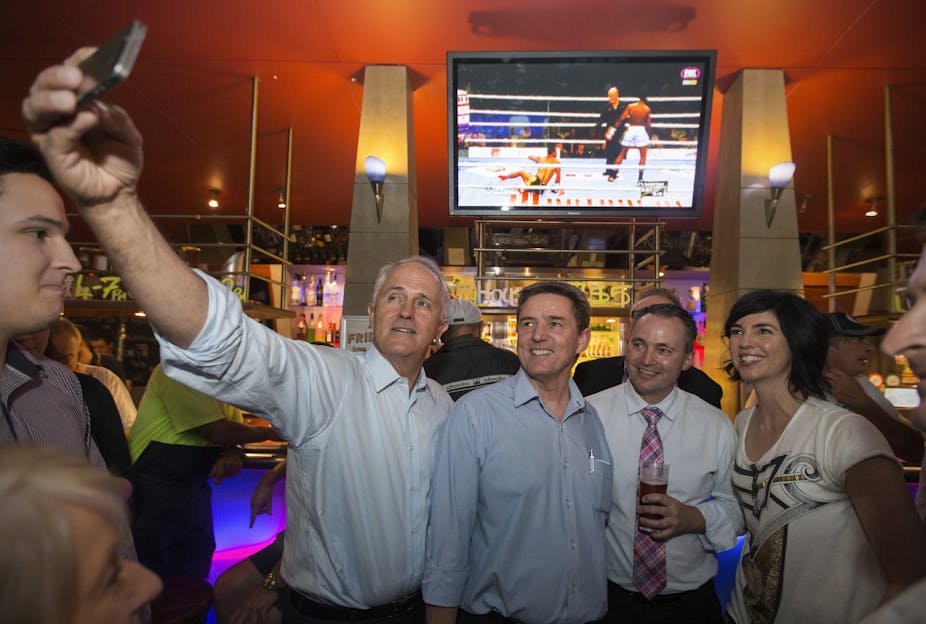The Coalition has a solid 53-47% two-party lead in the latest Fairfax-Ipsos poll but the ratings of Prime Minister Malcolm Turnbull, who marks six months in the job on Monday, have taken a hit in the last month.
Turnbull’s net approval has plummeted 15 points since February to plus 23, after a period of confusion about tax policy and speculation over the election date, while Opposition Leader Bill Shorten has narrowed Turnbull’s still-wide lead as preferred prime minister.
But after Newspoll and Essential have had the Coalition and opposition on 50-50, the government will be relieved at its two-party figure, which is up one point since last month. It represents a 0.5% swing against the Coalition since the 2013 election. The poll of 1402 was taken March 10-12.
With parliament resuming on Tuesday for the final week of this session, speculation remains high about a July 2 election. The Senate will be dominated by tactical manoeuvring and Labor filibustering but the government is expected to get its legislation to reform the Senate voting system through by the week’s end, thanks to a deal with the Greens.
The Ipsos poll showed the Coalition’s primary vote up one point to 45%; Labor down one point to 31%; and the Greens on 14%, down one point.
Turnbull’s approval fell seven points to 55%; his disapproval was up eight points to 32%.
Shorten’s approval rose three to 33%; his disapproval was down three to 52%, giving a net approval of minus 19 – an improvement of six points since February.
More than six in ten voters (61%) would prefer Turnbull as prime minister, down three points since February, compared with 22% who would prefer Shorten, a rise of three points.
As the government continues to consider its tax policy while launching assaults on Labor plans, especially to restrict negative gearing, the poll found more people opposed than supported limiting tax concessions for superannuation contributions or negative gearing. Only about one-third supported cutting either of these. Some 40% opposed limiting concessions for superannuation contributions; for negative gearing, the figure was 42%.
There was little difference between Coalition and Labor voters on superannuation. On negative gearing, 47% of Coalition voters opposed limiting concessions compared with 39% of Labor voters. 32% of Coalition voters supported restricting them, compared with 37% of Labor voters.
The government has apparently walked away from doing anything on negative gearing but has superannuation under active consideration.
The Coalition was well ahead on having the best policies for managing the economy – 43% (up two points since April last year) to Labor’s 25% (down seven points).
The government continues to keep its options open on budget timing, with careful wording in comments. “All of us are working towards delivering the budget in the usual timetable on the second Tuesday in May,” Finance Minister Mathias Cormann told Sky.
If there is a July 2 election the budget will have to be brought forward from May 10 to May 3 to obtain the necessary supply to carry through until the new parliament.
Shorten said that at Turnbull’s six-month anniversary it was clear “he’s basically given up on all of the hard things to do. Instead he’s just obsessed about the date of the election.
"Australians are massively disappointed by Mr Turnbull – they want to see an economic plan. They want to see a government focused on the budget, and the nation’s problems, not a government who is focused on just keeping their own jobs and racing to an earlier election.”
On Friday Turnbull flagged he would back off a double dissolution if the Senate passed the government’s industrial legislation.
Legislation to restore the Australian Building and Construction Commission (ABCC) faces defeat for the second time in the Senate, while a bill to tougher union governance is already a double-dissolution trigger.
“The only reason to go to a double dissolution is to resolve a deadlock,” Turnbull said last week.
“Now what I’m saying to the senators and particularly to the crossbenchers and indeed to the Labor Party and the Greens – vote for those bills. They are absolutely in the best interests of Australia, of the unions themselves, and particularly of their members.
"Well, they vote for those bills – then there would be no question, we wouldn’t even be talking about the possibility of a double dissolution. But … it is clearly an option, and it is something that the Government considers … but the way to take that option away is for the senators to pass those bills.”
He said a double dissolution would not be an early election, given the last election was early September 2013.
Under the government’s deal with the Greens on voting reform, the ABCC legislation is not on this week’s Senate timetable.
Meanwhile, federal Labor had an unwelcome shock when former federal Labor minister Stephen Smith announced on Sunday he was ready to challenge Western Australian Opposition Leader Mark McGowan.
Smith said he had been approached to enter state parliament and put his hand up because frontbench and backbench Labor members feared McGowan would not win next year’s election. McGowan accused him of having “brought the Canberra disease to Western Australia”. Shorten refused to be drawn beyond saying he expected WA Labor to sort the matter out very quickly.
The last thing Shorten wants is more destabilisation in WA, where he has already had all three Labor House of Representative members decide they will not contest the election and Joe Bullock announce he is quitting the Senate over Labor’s stance on same-sex marriage.

